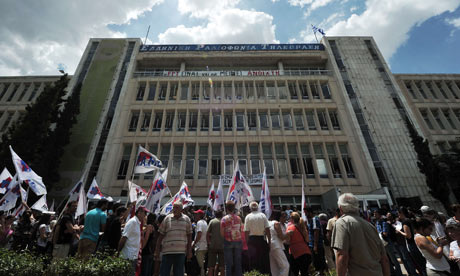Costas Douzinas guardian.co.uk, Wednesday 12 June 2013 22.47 AEST
Pulling the plug on our flawed but vital state broadcaster is political vandalism, with chilling echoes of the bad old days
People gather to protest outside Greece's state broadcaster ERT after the government's shock decision to close it. Photograph: Louisa Gouliamaki/AFP/Getty Images
The Greek government recently announced that the dreaded "grexit" (Greece leaving the euro) no longer threatened the nation and had been replaced by the Greek "success story". If it was a success it didn't last long. On Tuesday, Greece became the first developed nation since 2007 to be downgraded to emerging-market status by index provider MSCI.
On the same day, the privatisation of the Greece's Public Gas Corporation (Depa), was abandoned when Russia's Gazprom withdrew the only bid on the table. Greek prime minister Antonis Samaras, who had personally negotiated the deal, announced that the government would re-advertise the sale and not take further austerity measures to fill the financial gap created. Under the terms imposed by the troika, Athens must raise at least €1.8 bn from privatisation by the end of September and sack 4,000 civil servants by the end of the year.
Then, , without warning, the government pulled the plug on the Hellenic Broadcasting Corporation (ERT) with its three TV channels and numerous local radio stations. The ERT online operation is a lifeline for the Greek diaspora. ERT World might not have had the prestige of the BBC's World Service but it was the main link to the homeland for Greeks in Melbourne, London and Chicago. Greeks everywhere have been outraged and demonstrations have been organised in many European cities. The archbishop of Athens and major Greek diaspora organisations have joined the chorus of condemnation.
The government claimed that the closure was not linked to the fiscal gap but was part of the wider streamlining of the public sector. The 2,700 journalists and technicians summarily sacked assist on both counts. The government announcement said that the broadcaster suffers from a "unique lack of transparency and incredible waste". It is true that every time the government changed, managers and top journalists were appointed to pursue the new political agenda. But the blame lies squarely with the ruling New Democracy and Pasok parties, which ran the country like a private fiefdom for 40 years. It was their cronies and clients who inflated ERT's workforce.
When I heard of the sudden disappearance of the ERT signal from the screens while on air I was reminded of the military dictatorship. The TV station of the armed forces, the formal mouthpiece of the colonels, would regularly post a bland card on screen accompanied by stirring martial music. It caused fear and trepidation. It was invariably the sign of a bad turn: an aborted coup, the invasion of Cyprus, the overthrow of the dictators by even worse thugs. I don't know of any democratic government who could pull the plug on the national broadcaster without any discussion, or the agreement of its coalition parties.
I had the same sense of foreboding yesterday. The economic and humanitarian crisis that has befallen Greece has been well documented. Equally dramatic is the destruction of democracy that has been gathering pace. The country is ruled through government decrees without parliamentary approval. A presidential decree, a legal tool that deeply offends the rule of law, was used to silence ERT. Freedom of speech exists only for those who back the government. When the Guardian revealed extensive police torture, which had remained largely unreported in Greece, the government threatened to sue the newspaper and sacked two senior TV journalists who reminded their audience that this was an idle threat. Kostas Vaxevanis, the journalist who published the so-called Lagarde list of potential major tax evaders, has been prosecuted twice. Private TV channels act as the propaganda arm of the government silencing or attacking the left.
The attack on the public broadcaster is part of the wider conflict between private media moguls and the fast shrinking public media. The closure of ERT is a victory in the developing war between the Murdochs and the BBCs of this world. ERT aspired to BBC status and neutrality but successive governments did not allow it. Its news and current affairs promoted the government line but, unlike many private broadcasters, it aired opposition views. Its cultural and entertainment programmes, many from British sources, were a breath of fresh air in a landscape dominated by Turkish soaps and soft porn.
Whatever the government's motives, it clearly underestimated the Greeks love for their poor man's "auntie". ERT represents the dignity that remains in the public sector after four years of continuous attacks by the government on its probity, honesty and efficiency. Thousands of protesters demonstrated outside the ERT headquarters in Athens and cities all over Greece. ERT journalists are broadcasting their programmes, streamed via private websites and radio stations, as ERT transmitters are now guarded by riot police. It looks as if the Greeks, after a period of relative lull during which the baton was passed from Athens to Istanbul, have woken again. The Greeks have a word for Samaras's action: hubris. Perhaps the "Greek success" may happen after all – but in the form of nemesis for a government and policies that have laid waste to a proud people.
![The [Greek] European Tragedy](https://blogger.googleusercontent.com/img/b/R29vZ2xl/AVvXsEiWKI5s90SFm1wWTk6bs4p7CgslaC2SnYPsrZhb-B-smOufNNCSxCvpBLI9hOB-LsXZjir_PNmEiMk2-E62F3xkg96IoC6QFAaZAnPRTVH340IN9WBRmWJqPkjWlgyRj3zpALp7h6hvA58/s920/GkBack_new.jpg)

